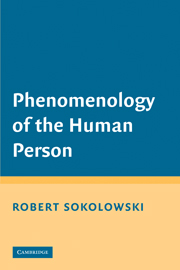Introduction
Published online by Cambridge University Press: 05 June 2012
Summary
The theme of this book is the human person. To make this subject more visible and easier to name, I wish to introduce the term “the agent of truth” as a synonym for “the human person.” The phrase is also meant to be a paraphrase of the term “rational animal,” the classical Latinate definition of human being. The book is an inquiry concerning the agent of truth.
The new term has two advantages over the old. First, it expands the meaning of thinking and truth. The word rational seems to limit thinking to calculation and inference, but the new phrase does not connote such a restriction. It encompasses all the forms of understanding, including those that go beyond language. Second, the term shows that attaining truth is an accomplishment and not merely passive reception. It speaks not just about reasoning but about success in reasoning, and so designates human being in terms of its highest achievement: the human person is defined by being engaged in truth, and human action is based on truth. I do not intend to prove that human beings are specified in this way (what sort of premises could I use?), but rather to describe, analytically, what our engagement in truth means. I hope to show, not to demonstrate, what we are as human persons.
We cannot help but take ourselves and one another as involved in truth, but what it means to be so implicated remains obscure to us.
- Type
- Chapter
- Information
- Phenomenology of the Human Person , pp. 1 - 4Publisher: Cambridge University PressPrint publication year: 2008

